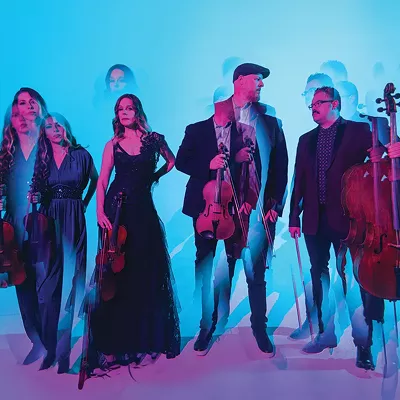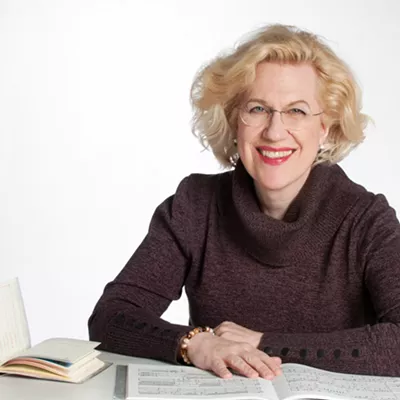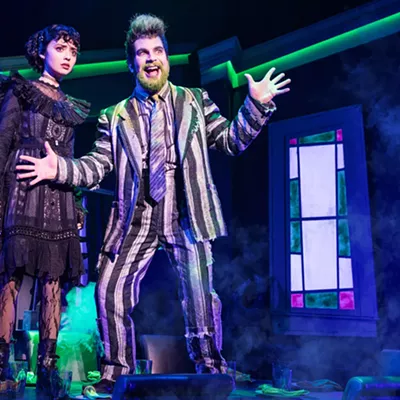Though best known for novels like Twenty Thousand Leagues Under the Sea and Around the World in Eighty Days, the French author Jules Verne started out as a short story writer.
One of his earliest forays was "A Voyage in a Balloon," a fictional escapade that begins when a reckless stranger suddenly leaps into the car of the narrator's hot air balloon. With little regard for the pilot's or his own welfare, the stranger insists that they fly higher and higher. The narrator meanwhile tries to appeal to safety and self-preservation.
Verne's works would influence writers such as Antoine de Saint-Exupéry, Jean Cocteau, Ray Bradbury and, more recently, Rick Riordan of Percy Jackson fame. But his tales fueled imaginations in other disciplines as well. In 2020, the Swedish composer Britta Byström wrote A Drama in the Air, an orchestral work that was directly inspired by "A Voyage in a Balloon." The roughly seven-minute piece swings between extreme tension and relief in an effort to capture the suspense of the airborne experience.
"In [Byström's] piece, you can hear the conflict the narrator feels about whether to listen to this stranger, who might kill him if he descends, or to try to land safely," says conductor Holly Hyun Choe. "The main takeaway is this line between life and death. And I appreciate that it doesn't have a clear ending because it opens it up to interpretation for both the reader and the listener."
Choe first learned A Drama in the Air when she participated in Denmark's Malko Competition for young conductors in 2021, and was impressed by the composer's "fascinating" way of "communicating story through orchestral color." As part of an ongoing personal effort to champion active female composers, she's advocated for more performances of Byström's works.
Which is one reason why, with Choe at the podium, Byström's A Drama in the Air will receive its U.S. premiere at the Spokane Symphony's upcoming Masterworks 5 program.
Titled "Holly Rachs!," this weekend's concert acknowledges its guest conductor as well as another emotionally charged piece on the program, Sergei Rachmaninoff's Piano Concerto No. 2 in C minor. The soloist is Charlie Albright, who grew up in Centralia, Washington, and now performs internationally and collaborates regularly with Yo-Yo Ma.
Unlike the Byström, which will likely be new to many listeners, "Rach 2," as it's often abbreviated, is a piece that crossed over into pop culture long ago. Parts of all three of the concerto's movements have famously found their way into films and TV, and Top 40 songwriters have borrowed and built on its memorable melodic lines.
For Albright, who came to the piano by playing "Great Balls of Fire" and Backstreet Boys tunes by ear, his first point of entry into "Rach 2" was Eric Carmen's "All by Myself."
"The entire verse of that is a direct take from the second movement of the Rachmaninoff concerto — except that they add the big chorus. And that never happens in the Rachmaninoff," he says, "so every time I perform it, during the second movement, I'm just waiting for that beat drop!"
But it's not just for its power ballad associations that "Rach 2" remains one of Albright's favorite concertos to perform. Rachmaninoff wrote the work during an especially dark period in his life, and Albright says that it channels a profound "dramatic passion" that continues to resonate with listeners.
"It's schmaltzy almost to the nth degree, but not in a superficial way," he says. "There's this desperation inherent to the piece, and in the third movement especially. Maybe it's a lost love. Maybe it's a reflection on life. But it's a very human experience that speaks to people. It's hard not to be moved to tears because it's so overwhelming emotionally."
Rounding out this Masterworks program is Johannes Brahms' Third Symphony. This, too, has a deeply emotional quality that, like much of Brahms' work, stems in part from his unrequited love for Clara Schumann. Perhaps driven by wishful thinking rather than true conviction, the composer incorporated a F-A -F musical motif that stands for the motto "Frei aber froh" — free but happy.
"I find more similarities than contrasts in this program," Choe says. "With both Rachmaninoff and Brahms, they had so many ups and downs in their careers, and with the Byström, there's this storyline of life and death. All the hardships that all three of them convey [in these works], that tonal language is easy for the audience to know and appreciate." ♦
Masterworks 5: Holly Rachs! • Sat, Jan. 20 at 7:30 pm and Sun, Jan. 21 at 3 pm • $19-$68 • The Fox Theater • 1001 W. Sprague Ave. • spokanesymphony.org • 509-624-1200























